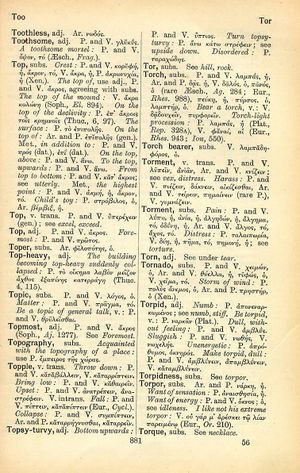torpor
Ἕκτορ νῦν σὺ μὲν ὧδε θέεις ἀκίχητα διώκων → Hector, you run in pursuit of something unattainable | Hector, now art thou hasting thus vainly after what thou mayest not attain | Hector, now you are hasting thus vainly after what you may not attain
English > Greek (Woodhouse)
subs.
Ar. and P. νάρκη, ἡ.
Want of sensation: P. ἀναισθησία, ἡ.
Want of energy: P. and V. ὄκνος, ὁ, see idleness.
I like not his extreme torpor: V. οὐ γάρ μʼ ἀρέσκει τῷ λίαν παρειμένῳ (Eur., Or. 210).
Latin > English (Lewis & Short)
torpor: ōris, m. torpeo,
I numbness, stupefaction, torpor (syn.: languor, veternus).
I Lit.: tutantur se torpore torpedmes, * Cic. N. D. 2, 50, 127; cf. Cels. 2, 8 med.; Plin. 2, 101, 104, § 223; 19, 8, 44, § 155; 29, 4, 28, § 90: illi membra novus solvit formidine torpor, Verg. A. 12, 867: torpor gravis illigat artus, Ov. M. 1, 548; id. P. 1, 2, 30 al. —
II Trop., sluggishness, listlessness, inactivity (post-Aug.): implicitas magno torpore cohortes vidit, Luc. 3, 432: torpor recens nimiā fortunae indulgentiā, Tac. H. 2, 99 med.: torpor Vitellii (opp. vigilantia Vespasiani), id. ib. 2, 77 fin.: procerum, id. G. 46: utraque res detestabilis est, contractio et torpor, Sen. Ep. 82, 3.
Latin > French (Gaffiot 2016)
torpŏr,¹² ōris, m. (torpeo), engourdissement, torpeur, atonie physique : Cic. Nat. 2, 127 ; Plin. 2, 123 ; Virg. En. 12, 867 ; Sen. Ep. 82, 3 || [fig.] Tac. H. 2, 77 ; 2, 99.
Latin > German (Georges)
torpor, ōris, m. (torpeo), die Betäubung, Erstarrung, Regungslosigkeit, I) eig.: a) infolge physischer Umstände, α) übh., Lucil., Cic. u.a.: contractio et torpor, Sen.: membrorum omnium torpor, Sen. rhet.: nervorum torpor tremorque, Sen. – β) infolge der Untätigkeit, die Erschlaffung, die Stumpfheit, das dumpfe Hinbrüten, t. recens, Tac.: t. Vitellii (Ggstz. vigilantia Vespasiani,) Tac.: sordes omnium ac torpor, Tac.: Ggstz. membrorum mobilitatem (expugnat) torpor et tarditas, Augustin. de civ. dei 19, 4, 2. p. 357, 2 D.2 – b) infolge einer Seelenstimmung, das Erlahmen der Geisteskraft und des Mutes, Lucan. 3, 432: utraque res detestabilis est, contractio et torpor, Sen. ep. 82, 3. – II) übtr., die Regungslosigkeit, Albani lacus otium et Baiani torpor, Plin. pan. 82, 1.

